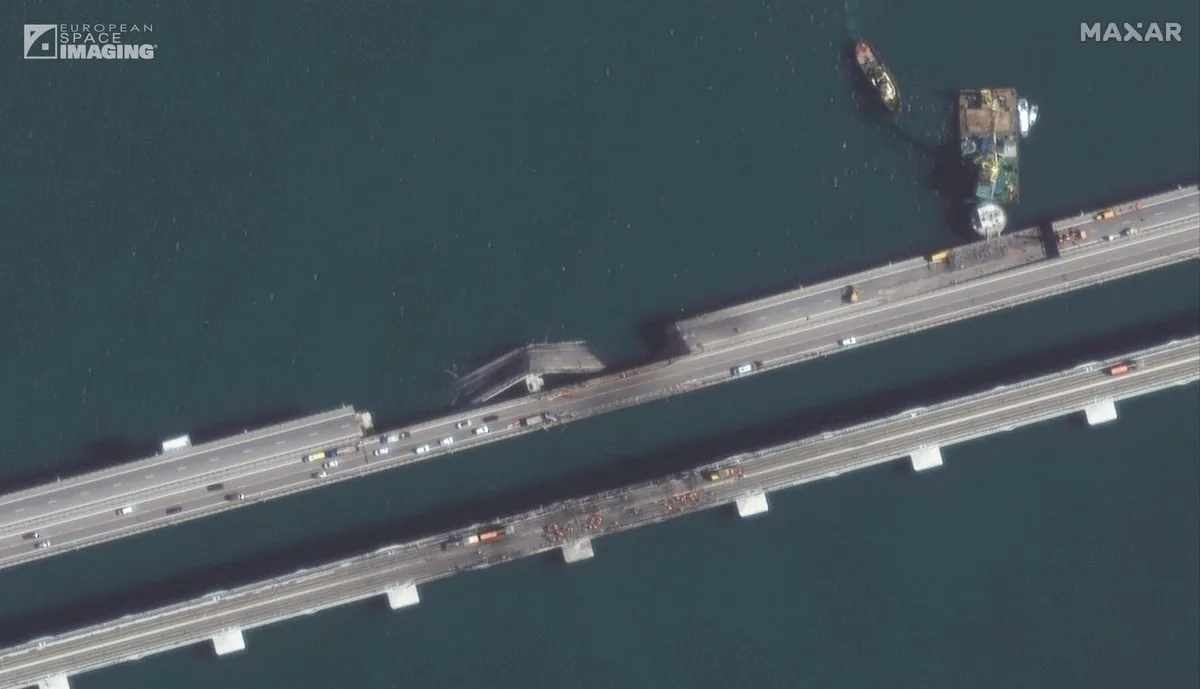Ukraine Challenges Russia's Control of Azov Sea in International Court
Ukraine accuses Russia of illegally seizing the Sea of Azov and Kerch Strait in a case at the Permanent Court of Arbitration. The dispute stems from Russia's actions following the 2014 Crimea annexation.

On Monday, September 23, 2024, a significant legal battle commenced at the Permanent Court of Arbitration in The Hague, Netherlands. Ukraine initiated proceedings against Russia, alleging unlawful control over the Sea of Azov and Kerch Strait. This case is part of a series of international legal disputes stemming from Russia's annexation of Crimea in 2014 and subsequent full-scale invasion of Ukraine in 2022.
The Sea of Azov, known as the world's shallowest sea with an average depth of 7 meters, has been a point of contention between the two nations. This body of water, covering approximately 39,000 square kilometers, is bordered by Ukraine to the northwest and Russia to the southeast. The Kerch Strait, connecting the Black Sea and the Sea of Azov, plays a crucial role in this dispute.
Anton Korynevych, representing Ukraine, stated that Russia aims to monopolize control over these strategic waters. He highlighted the construction of a bridge across the Kerch Strait as a key issue. This structure, known as the Crimean Bridge or Kerch Strait Bridge, spans 19 kilometers and is currently the longest bridge in Europe. Completed in 2018, it took four years to construct and consists of parallel road and rail bridges.

Ukraine contends that this bridge, valued at $3.5 billion, impedes international shipping while allowing smaller Russian vessels passage. Korynevych emphatically declared, "The bridge is unlawful and it must come down." It's worth noting that the bridge suffered partial damage in an explosion in October 2022, highlighting its strategic importance and vulnerability.
The case, initially filed by Ukraine in 2016, encompasses several allegations against Russia. These include:
- Violating the United Nations maritime treaty
- Restricting Ukrainian fishing activities
- Causing environmental damage
- Plundering underwater archaeological sites
Ukraine is seeking unspecified compensation for these alleged breaches.
The Sea of Azov's significance extends beyond geopolitics. It is home to over 300 species of fish and serves as a vital fishing ground for both nations. The sea's unique characteristics, including its low salinity due to freshwater inflow from rivers like the Don, contribute to its ecological importance.
In response, Russian Agent Gennady Kuzmin dismissed Ukraine's claims as "completely groundless and hopeless." Russia challenges the court's jurisdiction, arguing that the Sea of Azov and Kerch Strait are "internal waters" not subject to the United Nations Convention on the Law of the Sea.
The Kerch Strait, only about 4.5 km wide at its narrowest point, has been a historical site of conflict and an important trade route since ancient Greek times. Its strategic location and the strong winds and currents that affect it have made it a focal point of maritime incidents between Russia and Ukraine in recent years.
As the hearings progress behind closed doors, experts anticipate a lengthy process before a final ruling is reached. This case underscores the ongoing tensions in the region, where the Sea of Azov continues to be an area of dispute amidst broader conflicts.
"Russia wants to take the Sea of Azov and Kerch Strait for itself, and so it has built a great gate at the entrance to keep international shipping out while allowing small Russian river vessels in."
The outcome of this arbitration could have far-reaching implications for maritime law, regional stability, and the future of Ukrainian-Russian relations in the Black Sea region.


































